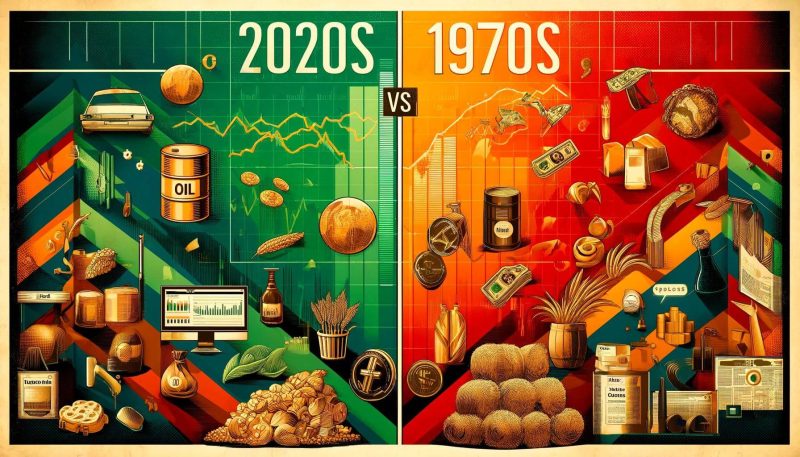2020s vs. 1970s: Will Commodity Trends Predict Inflation?
In today’s economic environment, investors face a panorama reminiscent of the inflation-ridden 1970s. With such historical inflation haunting the current decade, the financial focus has sharply pivoted back to commodities. Let’s discuss why commodities have reclaimed their spotlight in the market and examine their historical role during inflationary spikes and the potential for these patterns to repeat. By delving into the commodity market dynamics through detailed analysis of price movements and market trends, we will uncover the pressing relevance and necessity of investing in commodities today.
Why Commodities are Crucial in Today’s Inflationary Times
Commodities are fundamental to the global economy, serving as the backbone for various sectors by providing essential materials that feed, fuel, and facilitate the production of goods. Historically, investors have seen commodities like gold and oil as hedges against inflation. These tangible assets often increase in value when currencies devalue during inflationary periods, making them safe havens for investors. Recently, the commodities market has been buoyed by several factors, including geopolitical tensions, supply chain disruptions, and fluctuating currency values, all of which have reignited interest in this often-underestimated asset class. The renewed focus is not merely a trend but a strategic shift recognizing these assets’ protective value against inflation’s erosive effects on currency and capital.
Navigating Today’s Diverse Commodity Market Landscape
The commodity market is diverse, encompassing metals, energy, and agriculture, each responding differently to market stimuli. For instance, precious metals often perform well during monetary easing and devaluation. Meanwhile, energy assets like oil react sharply to geopolitical changes and supply adjustments. Factors such as weather conditions, export regulations, and technological changes influence agricultural commodities. Understanding these categories’ nuances allows investors to make informed decisions, optimizing their portfolios to withstand economic downturns better and capitalize on price upswings.
Surging Metal Prices: Driven by Tech and Green Energy
In the metals sector, recent years have witnessed a significant revaluation of resources like copper and nickel, driven largely by the tech industry’s demand for materials used in electronics and renewable energy solutions. The rapid development of battery technology and solar panels has particularly highlighted the importance of these metals, reflecting a broader industrial shift towards sustainability and energy efficiency.
Energy Markets: Volatility Amid Global Shifts
The energy segment has experienced turbulence, especially in the oil markets. Crude oil prices have historically been a bellwether for economic health. Moreover, recent fluctuations underscored the global economy’s interconnectedness and vulnerability to supply chain disruptions, OPEC decisions, and international conflicts that can all drastically affect oil supplies and prices.
Agricultural Commodities Face Climate Change Challenges
Agricultural commodities have seen varied trends, with prices often subjected to the unpredictable whims of climate change—ranging from droughts to floods—which affect crop yields and, consequently, global food prices. This sector’s volatility can lead to significant inflationary pressures, as food costs constitute a primary component of consumer price indices.
Pre-1970s Calm? Inflation Trends and Market Sentiments
Commodity allocations are currently at historically low levels. This situation is similar to periods just before significant rises in inflation. Consequently, the current market sentiment might underestimate the potential for inflationary spikes.
This complacency is similar to the calm before a storm. Specifically, it recalls the late 1960s, which prefaced the rampant inflation of the 1970s. Today, the economic landscape appears similarly poised. With robust employment figures and substantial governmental fiscal support, the stage is potentially set for unexpected inflationary pressures.
Major Drivers Behind Current Commodity Market Fluctuations
Energy Transition
The energy sector’s gradual pivot from fossil fuels to renewable sources has profoundly impacted these markets, especially metals. This transition supports a surge in demand for commodities like lithium and cobalt, essential for battery production, and rare earth elements used in various high-tech green technologies.
Trading Volumes
Oil markets have seen a dramatic shift in trading patterns and volumes. Brent Crude, for example, has consistently maintained higher liquidity than WTI, becoming a favoured benchmark in global oil pricing. This shift reflects broader market preferences and strategic trader responses to global economic trends.
Price Movements in Soft Commodities
Extreme weather events linked to climate change have increasingly impacted the soft commodities sector, leading to sharp price increases for crops like cocoa, coffee, and cotton. These price spikes affect this market and ripple through the economy, contributing to inflationary pressures as higher raw material costs are passed on to consumers in the form of increased food and clothing prices.
How Commodities Diversify and Protect Portfolios
Investing in commodities offers two benefits: protection against inflation and portfolio diversification. Historically, these assets have provided a buffer against inflation, eroding cash value and bond yields while offering uncorrelated returns compared to traditional equity markets. This diversification is crucial in managing risk and achieving more stable long-term returns, particularly through instruments like commodity indices, which track a broad basket of commodities to provide exposure across the sector.
Why Commodities are KeyAre Withstanding Inflation Cycles
Reflecting on historical economic cycles, particularly the 1970s, provides invaluable insights. These insights help understand the potential trajectory of today’s inflationary trends. Additionally, they highlight the strategic role commodities could play in mitigating these pressures. The pre-inflationary conditions of the past and present show striking similarities—robust economic indicators, low commodity allocations, and rising employment levels. Consequently, this suggests that increasing commodity investment could be prudent.
Commodities offer several benefits. They provide a hedge against inflation and serve as essential elements in a diversified investment strategy. These assets are poised to deliver value in a cyclically inflationary world economy. Therefore, understanding and leveraging them could be key to navigating the potentially turbulent economic waters.
Today, commodities are more than just industrial and economic staples. They are strategic investments that safeguard value and ensure growth across market cycles. Given that history often repeats itself, the conditions of the 1970s might reoccur. This repetition makes a compelling case for commodities as an indispensable component of any forward-thinking investment portfolio.
The post 2020s vs. 1970s: Will Commodity Trends Predict Inflation? appeared first on FinanceBrokerage.







































